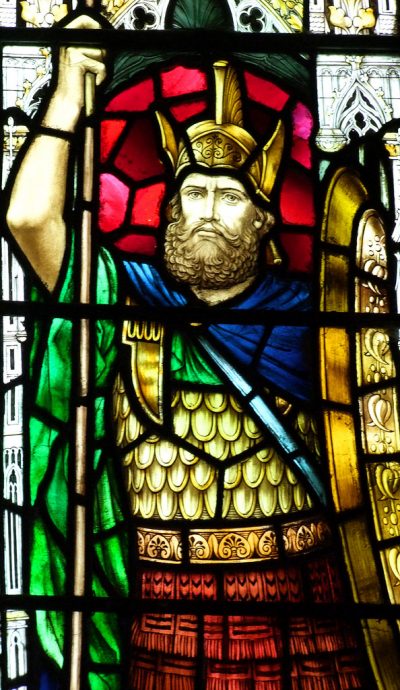Quae sunt Dei Deo

22nd Sunday after Pentecost
Today, in Rome, even as I speak, seven new saints are being canonised: José Sánchez del Río, a fourteen year-old boy who was killed in 1928 in Mexico by agents of the anti-Catholic and anticlerical government; José Gabriel del Rosario Brochero, a priest of the Argentine who travelled enormous distances on mule–back during the 19th century to bring the sacraments to the poor; Salomon Leclercq, a Brother of the Christian Schools and a martyr of the French Revolution; Manuel Garcia Gonzalez, bishop of Palencia and founder of the Congregation of the Eucharistic Missionaries of Nazareth and the Eucharistic Reparation Union; Lodovico Pavoni, priest and founder; Alfonso Maria Fusco, priest and founder; and Elisabeth of the Trinity, Discalced Carmelite Nun of Dijon. It is fitting that these canonisations should take place as the Church, through her liturgy, enters into a kind of Harvest–tide. These are the sowers of whom the Psalmist says:
They that sow in tears shall reap in joy. Going they went and wept, casting their seeds. But coming they shall come with joyfulness, carrying their sheaves. (Psalm 125:5–7)
Harvest–tide
Harvest–tide brings with it an exuberant joy and thanksgiving; at the same time, there is a certain sadness about it. It signifies the end of a cycle of life, a kind of death. Once the crops have been harvested, the fields lie empty. There is a chill in the air. Even if Saint Martin’s summer promises a few days of sunshine in November, the approach of winter moves us to think of the last things. All of nature will conspire to say to us what Saint Benedict enjoins in Chapter IV of the Holy Rule: “To keep death daily before one’s eyes.”.
Introit
The Introit today is taken from the Church’s favourite psalm of supplication for the faithful departed, the De Profundis, Psalm 129:
If thou, O Lord, wilt mark iniquities: Lord, who shall stand it.
For with thee there is merciful forgiveness, O God of Israel. (Psalm 129:3–4)
The last phrase, “O God of Israel” is particularly poignant because today at Matins we read of the heroes of Israel, the Holy Maccabees, and of the death on the battlefield of the valiant Judas Maccabeus, a figure of Christ, the Dux vitae mortuus, the Prince of Life who, slain, reigns immortal.
Collect
The Collect reminds us that even in the face of apparent defeat, even “in the midst of the shadow of death” (Psalm 22:4), God remains our refuge and our strength. He is, moreover, the auctor pietatis, the origin and source of the piety by which we can approach Him with boundless confidence of sons.
Epistle
In the Epistle, Saint Paul gives us a salutary infusion of holy optimism: “I am”, he says, “confident of this very thing, that he, who hath begun a good work in you, will perfect it unto the day of Christ Jesus” (Philippians 1:6).
Gradual
The Gradual sings of life together as a family of brethren constituted not “not of blood, nor of the will of the flesh, nor of the will of man, but of God” (John 1:13). “Behold how good and how pleasant it is for brethren to dwell together in unity” (Psalm 132:1). It is an immense grace to live together as brethren in unity. In a world where so many struggle in isolation and where, in spite of the mad proliferation of social media, a mortal loneliness is the lot of so many, we must be grateful that God has called us to the cenobitical life. Together we experience the truth of the proverb: “A brother that is helped by his brother, is like a strong city” (Proverbs 18:19).
Alleluia and Gospel
The Alleluia verse summons us to an indefectible hope: “They that fear the Lord have hoped in the Lord: he is their helper and their protector” (Psalm 113:119). We hope in the Lord because, as Our Lord shows us in the Gospel, He has marked us with His own image. We owe ourselves not to Caesar, nor to any earthly power, nor to any political system or party, but to God alone. “Know ye that the Lord he is God: he made us, and not we ourselves.” (Psalm 99:3). Quae sunt Dei Deo.
Offertory
The Offertory Antiphon (Esther 14:12–13) is the supplication of Esther. Esther is the feminine complement of the heroic Maccabees. Esther battles for Israel, not with the weapons of war, but with the weapons of prayer and of fasting. In this, she is an image of the Church who, contending “against principalities and powers, against the rulers of the world of this darkness, against the spirits of wickedness in the high places” (Ephesians 6:12) wields nought but the weapons of prayer and penance.
Secret
In the Secret, we shall pray to be “kept from all harm”. The petition corresponds to the situation of the Church, exposed as she is on the ground of battle. The Communion Antiphon will teach us how to pray: we shall be heard if we pray with filial boldness and with confidence. “I have cried to thee, for thou, O God, hast heard me: O incline thy ear unto me, and hear my words” (Psalm 16:6). And in the same psalm, we pray, “From them that resist thy right hand keep me, as the apple of thy eye. Protect me under the shadow of thy wings.” (Psalm 16:8).
Postcommunion
The Postcommunion is wonderfully comforting because it designates the Most Holy Eucharist as the infirmitatis auxilium, our help in infirmity, our succour in weakness. To us who go forward through the golden glimmers of harvest–tide into the cold and darkness of winter and into all that lies unknown before us on the battlefield of life, Our Lord gives Himself, nothing less than Himself, as the infirmitatis auxilium, and this already fills us with thanksgiving. He will, as the Apostle says, “perfect what He has begun in us”.
